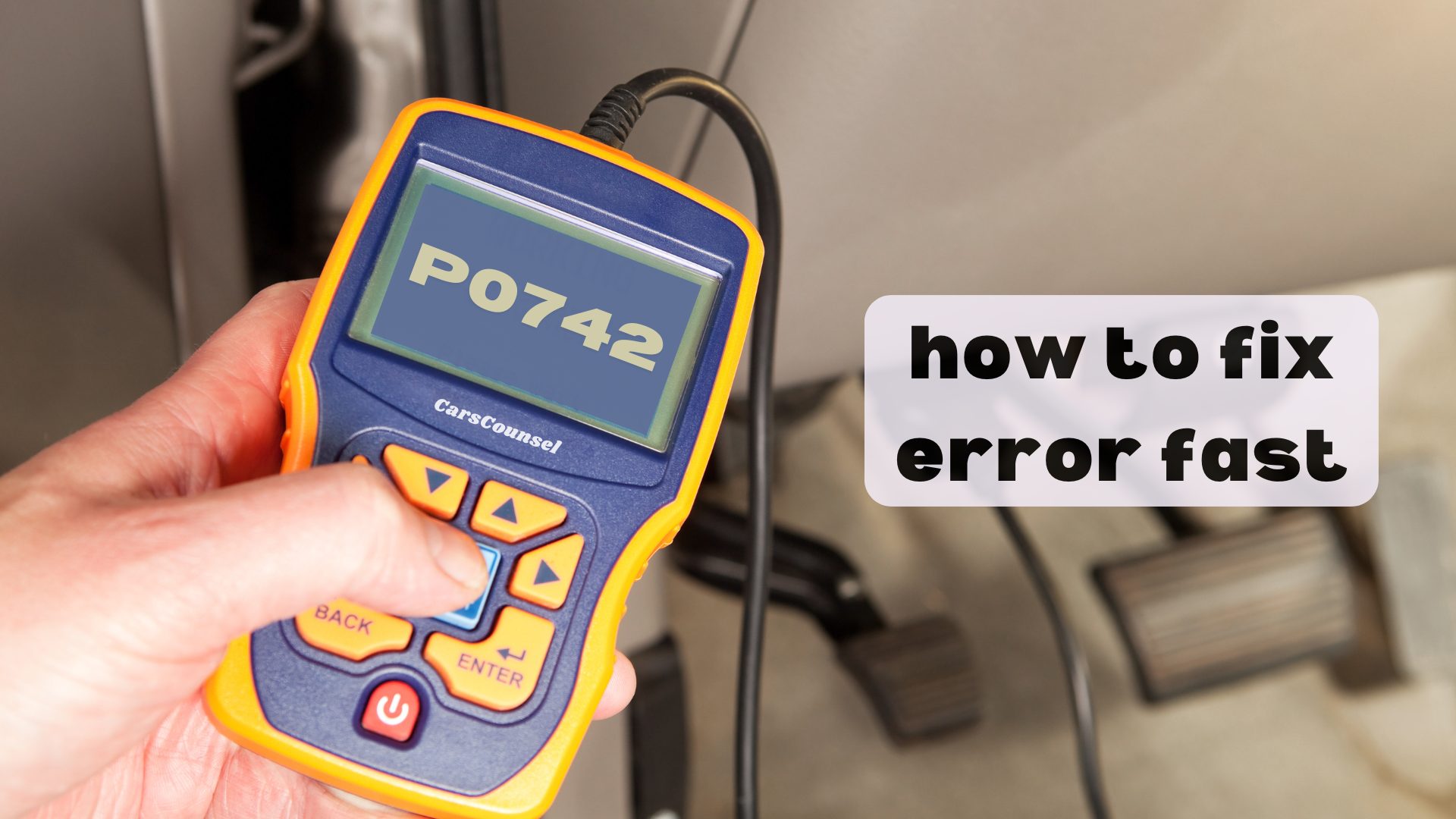Is it possible that the P0742 code is an easy fix?
First, confirm the OBD2 error with an OBD-II scanner and look at your transmission system for any obvious damage.
Make sure to check the transmission fluid level and condition since low or dirty fluid can cause big problems.
Don’t forget to test the torque converter clutch (TCC) solenoid with a multimeter; a bad solenoid could be the issue.
Taking these steps quickly can help prevent future problems, but there’s more to do to make sure your vehicle runs smoothly.

Quick Navigation
Key Takeaways
- Use an OBD-II scanner to confirm the P0742 code and figure out what’s wrong.
- Check the transmission fluid and replace it if it’s low or dirty.
- Look for and fix any damaged wiring or connectors that could be affecting the TCC solenoid.
- Test the torque converter clutch solenoid to make sure it’s working properly and replace it if it’s not.
What Is the P0742 Code?
The P0742 code means there’s a problem with the torque converter clutch (TCC) in your car’s automatic transmission. This clutch is crucial for making sure your car runs smoothly.
If the TCC isn’t working right, you might notice your car slipping or not accelerating well because the engine’s power isn’t being properly transferred to the transmission.
Common reasons for this issue include a bad TCC solenoid, low or dirty transmission fluid, or wiring problems.
To figure out what’s wrong, you usually need a special scanner and a close look at the parts involved. This helps to find the exact problem so it can be fixed correctly.
Importance of Fixing P0742
Ignoring the P0742 code can lead to serious transmission damage, worse gas mileage, and expensive repairs. It’s important to fix this code right away.
The P0742 code means there’s a problem with the torque converter clutch (TCC) circuit, which can mess up how smoothly your car shifts gears. If you don’t take care of it, the problem can get worse, leading to major transmission wear and even failure.
Plus, driving with a bad TCC can cause overheating and slipping, which damages the transmission even more. By fixing the P0742 code now, you can prevent big mechanical issues and make sure your car runs well, saving you money and time in the long run.
Common Symptoms
Common Symptoms
When your vehicle has a P0742 code, you’ll notice a few problems like slipping gears, poor acceleration, and overheating. These issues often happen because the torque converter isn’t working right.
Here are some signs to look out for:
- Slipping gears: The transmission might shift unpredictably, making it tough to keep a steady speed.
- Poor acceleration: Your vehicle has a hard time speeding up, which means the torque converter isn’t passing power efficiently.
You can use diagnostic tools to check for the P0742 code and find the exact problem.
Spotting these symptoms early can stop further damage and ensure your car stays safe to drive. Don’t ignore these warning signs; fix them quickly.
Potential Causes
A P0742 code usually shows up because of problems like a bad torque converter clutch solenoid, low or dirty transmission fluid, or damaged wiring and connections.
If the torque converter isn’t working right, it can’t control the flow of transmission fluid well, leading to circuit issues. Low or dirty transmission fluid messes with lubrication and cooling, causing the torque converter to work poorly.
Also, damaged wiring or connections can stop the solenoid from doing its job, which triggers the P0742 code.
Make sure all wiring is in good shape and fluid levels are correct. Fixing these issues quickly can help you avoid bigger transmission problems later on.
Susceptible Car Models
Some cars, like the Honda Odyssey, Ford Taurus, and Nissan Maxima, are more likely to have the P0742 code. This code often comes up because of problems with the Torque Converter Clutch (TCC) circuit.
- Honda Odyssey: Often has issues with the torque converter and solenoids.
- Ford Taurus: Watch out for problems with the wiring and solenoids.
To keep your car running well, here are some tips:
- Regular Maintenance: Routine checks can catch problems early.
- Fluid Checks: Make sure the transmission fluid is clean and at the right level.
Being proactive can help you avoid issues related to the P0742 code.
Diagnostic Process
To fix the P0742 code, start by using an OBD-II scanner to confirm the code is there.
Then, take a close look at the transmission system for any visible damage.
Check for any frayed or damaged wires and connections that could affect the torque converter clutch (TCC) solenoid.
Next, test the transmission pressure to make sure the TCC is engaging properly.
Also, check if the TCC solenoid is working correctly.
If you need more help, consult a professional mechanic for accurate diagnostics and repair.
Following these steps will help you effectively resolve the P0742 code.
Transmission Fluid Check
Before getting into more complicated diagnostics, you should first check the transmission fluid level and condition. Making sure the fluid is at the right level and in good shape can prevent many transmission issues, including the P0742 code.
Here are some tips for maintaining your transmission:
- Check Fluid Level: Make sure the fluid is at the correct level, as low fluid can cause transmission problems.
- Inspect Fluid Color and Smell: Healthy fluid is usually red and doesn’t have a smell. If the fluid is dark or smells burnt, it might be contaminated or overheated.
Regular checks and timely fluid changes can save you from expensive repairs and ensure your vehicle runs smoothly.
Testing the Solenoid
To test the solenoid, you need to check its electrical resistance to make sure it’s working properly in the TCC circuit.
First, find the TCC solenoid and disconnect its electrical connector. Use a multimeter to measure the resistance across the solenoid terminals. The specific resistance value will be in your vehicle’s service manual. If the resistance isn’t within the recommended range, the solenoid might be faulty.
You can also use a scan tool to turn the solenoid on and off while watching for a response. Listen for an audible click or check for changes on the scan tool. If these tests show there’s a problem, you’ll probably need to replace the solenoid to get the TCC working right again.
Effective Repair Solutions
Once you know the solenoid is faulty, replacing it is one of the best ways to fix the P0742 code and can greatly improve your car’s performance.
Here are some things to think about:
- Check Repair Costs: Replacing a solenoid can be expensive. Compare prices and consider the value of hiring a professional to ensure the job is done right.
- Professional Help: Getting an experienced mechanic can save you time and ensure the repair is correctly done, preventing more problems down the road.
These steps will help you fix the P0742 code and get your car running smoothly again.
Preventive Measures
Regularly checking and changing your transmission fluid is key to preventing problems that can lead to the P0742 code. Keeping the fluid clean and at the right levels helps ensure your transmission stays in good shape and avoids issues with the TCC circuit.
Make it a habit to get your vehicle inspected regularly. Watch for early signs of transmission trouble, like slipping or overheating.
Try not to tow heavy loads or overload your vehicle, as this can put extra stress on the transmission. Regularly check for and fix any damaged wiring or connectors to keep the solenoid working properly.
For complicated transmission issues, it’s best to consult with professionals to tackle problems before they get worse. Following these steps will help keep your transmission in top condition and reduce the chances of running into the P0742 code.
More OBD-II Codes
Frequently Asked Questions
Can Driving With a P0742 Code Damage My Vehicle?
Driving with a P0742 code can be really risky and might damage your transmission. Problems with the TCC circuit can cause your transmission to overheat, accelerate poorly, and slip. If you don’t fix these issues quickly, you could end up with serious transmission damage.
How Much Does It Cost to Repair a P0742 Code?
Fixing the P0742 code can be quite expensive. The cost can range anywhere from $150 to $1,000, depending on the parts and labor needed. Just figuring out what’s wrong can cost between $100 and $200. It’s a good idea to get a few quotes to make sure you’re getting a fair price.
Are There Any Temporary Fixes for the P0742 Code?
If you see the P0742 code, you can try some quick fixes like adding or changing the transmission fluid, looking at and fixing any wiring issues, or resetting the transmission control module (TCM). These might help for a short time, but you’ll likely need a professional repair to fix the problem for good.
Can I Fix the P0742 Code Issue Myself Without Professional Help?
Fixing the P0742 code on your own means using some diagnostic tools and doing some basic repairs. Start by checking the transmission fluid, looking at the wiring, and testing the TCC solenoid. If you’re not confident, it might be best to ask a professional for help with more complicated problems.
Does Weather Affect the Occurrence of the P0742 Code?
Yes, weather can affect when the P0742 code shows up. Changes in temperature can influence how thick or thin the transmission fluid is and how well the solenoid works, which might lead to problems with the TCC circuit. Regular maintenance can help reduce these issues.
Conclusion
Fixing the P0742 code is really important for your car’s health.
By dealing with transmission fluid problems and testing the TCC solenoid, you can stop a small issue from becoming a big one.
Regular maintenance helps keep your car running well.
Remember, fixing things early can save you from more expensive repairs later.

